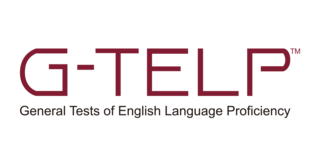The Japanese-Language Proficiency Test, or JLPT, is a standardized criterion-referenced test to evaluate and certify Japanese language proficiency for non-native speakers, covering language knowledge, reading ability, and listening ability. The test is held twice a year in Japan and selected countries, and once a year in other regions. The JLPT is conducted by the Japan Foundation for tests overseas, and Japan Educational Exchanges and Services for tests in Japan.
Test of English as a Foreign Language is a standardized test to measure the English language ability of non-native speakers wishing to enroll in English-speaking universities. The test is accepted by more than 11,000 universities and other institutions in over 190 countries and territories. TOEFL is one of several major English-language tests worldwide, including IELTS, Duolingo English Test, Cambridge Assessment English, and Trinity College London exams.

The International English Language Testing System is an international standardized test of English language proficiency for non-native English language speakers. It is jointly managed by the British Council, IDP: IELTS Australia and Cambridge Assessment English, and was established in 1989. IELTS is one of the major English-language tests in the world. There are two modules and an additional test.
The Swedish Scholastic Aptitude Test (SweSAT)(Swedish: högskoleprovet) is a standardised test used as one of the means to gain admission to higher education in Sweden. The test itself, which is administered by the Swedish Council for Higher Education, is divided into a mathematical part and a verbal part, which both respectively contain 4 subdivisions, in total 160 multiple-choice questions. All sections are taken in one day, a Saturday in April or a Sunday in October, lasting between 7½ and 8 hours including breaks between each section and a lunch break. Apart from the English language reading comprehension test, all sections are taken in Swedish.
The Test of English for International Communication (TOEIC) is an international standardized test of English language proficiency for non-native speakers. It is intentionally designed to measure the everyday English skills of people working in an international environment.
Communicative language teaching (CLT), or the communicative approach (CA) , is an approach to language teaching that emphasizes interaction as both the means and the ultimate goal of study.

The Hong Kong Advanced Level Examination, or more commonly known as the A-level, conducted by the Hong Kong Examinations and Assessment Authority (HKEAA), was taken by senior students at the end of their matriculation in Hong Kong between 1979 and 2012. It was originally the entrance examination in University of Hong Kong until the introduction of the Joint University Programmes Admissions System (JUPAS) in 1992, which made it the major university entrance examination until academic year 2011/2012.
The Secondary School Admission Test (SSAT) is an admission test administered by The Enrollment Management Association in the United States to students in grades 3–11 to provide a standardized measure that will help professionals in independent or private elementary, middle, and high schools to make decisions regarding student test taking.
C2 Proficiency, previously known as Cambridge English: Proficiency and the Certificate of Proficiency in English (CPE), is an English language examination provided by Cambridge Assessment English (previously known as Cambridge English Language Assessment and University of Cambridge ESOL examination).
Mute English is a term coined in the People's Republic of China to describe a phenomenon where people cannot speak English well and have a poor listening comprehension as a second language, typically through the traditional method of English language teaching where English is only taught as a subject. The phrase is a calque of the Chinese phrase "哑巴英语". The phenomenon is sometimes referred to as Dumb English.
B2 First, previously known as Cambridge English: First and the First Certificate in English (FCE), is an English language examination provided by Cambridge Assessment English (previously known as Cambridge English Language Assessment and the University of Cambridge ESOL examinations).
Language teaching, like other educational activities, may employ specialized vocabulary and word use. This list is a glossary for English language learning and teaching using the communicative approach.
CELPE-Bras is the only certificate of proficiency in Brazilian Portuguese as a second language officially recognized and developed by the Brazilian Ministry of Education. The Celpe-Bras exam is offered in Brazil and many other countries, such as the United States, Germany, Chile, Colombia and Japan, with the support of the Brazilian Ministry of International Relations.

The Test of Chinese as a Foreign Language is the Republic of China (Taiwan)'s standardized test of proficiency in ROC Standard Chinese for non-native speakers such as foreign students. It is administered by the Steering Committee for the Test Of Proficiency-Huayu (SC-TOP). The committee is under the direction of Taiwan's Ministry of Education. The test was formerly known as the TOP or Test Of Proficiency-Huayu.
The Test of Russian as a Foreign Language (TORFL) is a contemporary test of Russian language for foreign citizens compliant with the best European quality standards.

The International Test of English Proficiency or iTEP is a language assessment tool that measures the English skills of non-native English speakers. The test is supported by more than 700 institutions including the California State University system. The test is available in more than 40 countries, and is also used by businesses, and governments such as Saudi Arabia, Colombia, and Mexico for large-scale initiatives. There are over 600 iTEP test centers worldwide, with more than 100 in China where iTEP has partnerships with some of the largest education companies in the country.

The international ECL examination system provides a standardised test-system customised to the languages of the EU member states and the EU candidate countries. The test-system is based on the recommendations of the Common European Framework of Reference (CEFR) and is operated by the European Consortium for the Certificate of Attainment in Modern Languages (ECL). The ECL is an association of institutions representing European languages.
The SAT Subject Test in Spanish was a standardized test given by the College Board that assessed fluency in Spanish among high school students. It was typically taken after three to four years of studying the language, once the student had reached a significant level of understanding and competence in it. The test also partially emphasized preparation for AP Spanish and/or Spanish as a course in College. Passage selections were drawn from prose fiction, historical works, and newspaper and magazine articles, as well as advertisements, flyers and letters.
Advanced Placement (AP) International English Language is an AP Examinations course managed by Educational Testing Service (ETS) with the sponsorship of the College Board in New York. It is designed for non-native speakers to prepare for studying in an English-speaking university, particularly in North America. The course also gives students a chance to earn college credit. The three-hour exam assesses four language skills: listening, reading, writing, and speaking. The test paper has two sections: multiple-choice questions and free-response questions. APIEL committee consists of high school and university English teachers from Belgium, China, France, Germany, Switzerland, and the United States.

General Tests of English Language Proficiency (G-TELP) are English language tests, developed by the International Testing Services Center (ITSC) in 1985. They comprehensively evaluate the practical English use ability of test takers who do not speak English as their native language.




